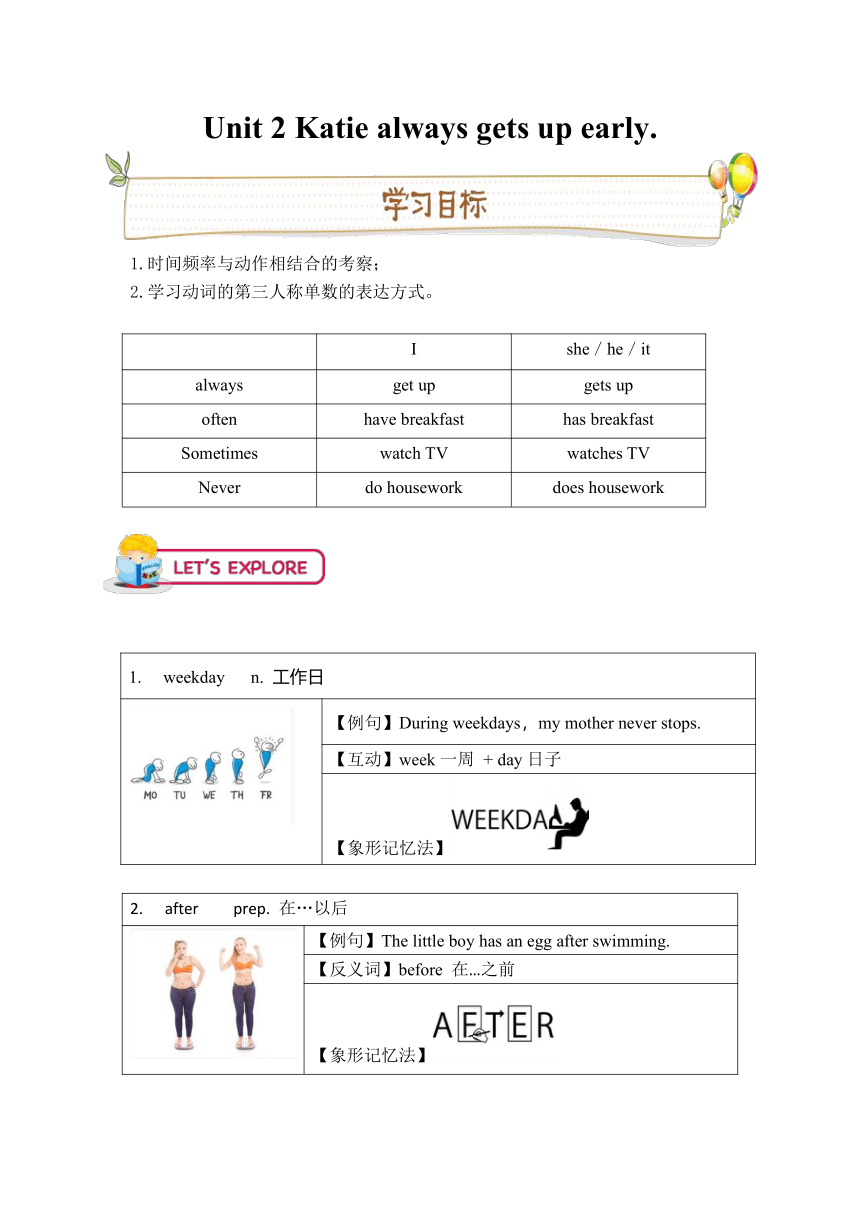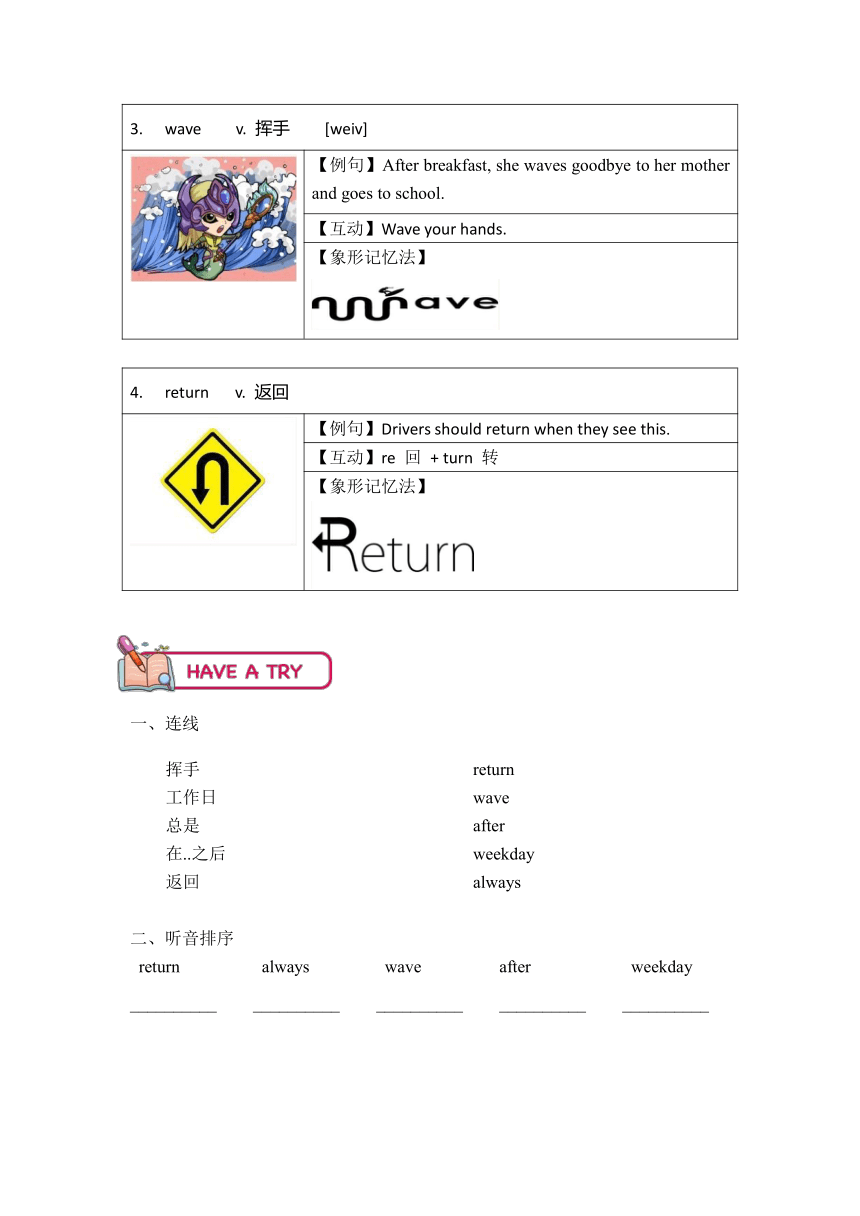Unit 2 Katie always gets up early 讲义+练习(无答案)
文档属性
| 名称 | Unit 2 Katie always gets up early 讲义+练习(无答案) |  | |
| 格式 | docx | ||
| 文件大小 | 1.4MB | ||
| 资源类型 | 教案 | ||
| 版本资源 | 湘少版 | ||
| 科目 | 英语 | ||
| 更新时间 | 2023-08-24 09:30:44 | ||
图片预览



文档简介
Unit 2 Katie always gets up early.
1.时间频率与动作相结合的考察;
2.学习动词的第三人称单数的表达方式。
I she/he/it
always get up gets up
often have breakfast has breakfast
Sometimes watch TV watches TV
Never do housework does housework
weekday n. 工作日
【例句】During weekdays,my mother never stops.
【互动】week一周 + day日子
【象形记忆法】
after prep. 在…以后
【例句】The little boy has an egg after swimming.
【反义词】before 在…之前
【象形记忆法】
wave v. 挥手 [weiv]
【例句】After breakfast, she waves goodbye to her mother and goes to school.
【互动】Wave your hands.
【象形记忆法】
return v. 返回
【例句】Drivers should return when they see this.
【互动】re 回 + turn 转
【象形记忆法】
连线
挥手 return
工作日 wave
总是 after
在..之后 weekday
返回 always
听音排序
return always wave after weekday
__________ __________ __________ __________ __________
【重点解析】
1.Her family often has breakfast at 6:45 a.m. 她的家人经常在早上6:45吃早餐。
1)此句重的 have 的意思是“有,吃”,e.g.
have a pen 有一支钢笔
have lunch 吃中饭
2)at 6:45 a.m. 在早上6:45 ,表示在几点中用介词 at。
2.After breakfast, she waves goodbye to her mother and goes to school.
早餐过后,她挥手跟她的妈妈道别,去上学。
after意思是在..之后,e.g. after lunch在中饭之后
always总是 usually 通常 often经常 sometimes 有时 never 从不
单选题
1.We have lunch _________ 12:30
A.at B.on C.in
2.I like the weather _______ Changsha.
A.in B.at C.on
3.Let’s go and ________ a look.
A.to have B.having C.have
4.I give a pen ________ you.
A.to B.of C.in
5.She _____ to school by bus.
A.goes B.to go C.go
连词成句
she,gets,up ,early , often (.)
_____________________________________________________
Let’s,and, a, go, look, have(.)
_____________________________________________________
lunch, after, at,her, family, always,take,walk,a(.)
_____________________________________________________
home, she,returns,5:30,at(.)
_____________________________________________________
homework,her,she,always,does,(.)
_____________________________________________________
语法:一般现在时的第三人称单数形式
动词变为第三人称单数形式的常见规则:
1. 一般情况下,直接在动词词尾+s,读音规则:清后清,浊后浊。
例如:get→gets;take→takes;run→runs。
2. 以s, sh, ch, x结尾的动词,在词尾+ es,读音发/iz/。例如:teach→ teaches; fix→fixes。
3. 以辅音字母+ y 结尾的动词,变y 为i,再+ es.
如:study→ studies; try→tries。
4. 以o结尾的动词,直接+es,如:do→does; go→goes。
5. have的三单形式为has。
一般现在时的基本句型
含有be动词的句子
肯定句: She is a student.
否定句:She is not a student.
一般疑问句:Is she a student?
特殊疑问句:What is she?
不含be动词的句子(否定句和疑问句中需要借用助动词do/does)
肯定句:She swims very well.
否定句:She does not swims very well.
一般疑问句:Does she swim very well?
特殊疑问句:What does she do?
一、 写出下列动词的第三人称单数
drink__________ go __________ stay __________ make ___________
look___________ have__________ pass___________ carry___________
二、用括号内动词的适当形式填空。
1. He often ____________ (have) dinner at home.
2. Daniel and Tommy _______________ (be) in Class One.
3. We _______________ (watch) TV on Monday.
4. Nick_______________ (go) to the zoo every Sunday.
5. What _______________they often_______________ (do) on Saturdays
句式转换
I often eat breakfast at 7:00.(改为否定句)
__________________________________________
Lingling always likes swimming.(改为一般疑问句)
__________________________________________
Dongdong has a toy car.(改为否定句)
__________________________________________
Katie waves goodbye to her mother.(改为一般疑问句)
__________________________________________
He has a nice day.(改为一般疑问句)
__________________________________________
词汇 always,weekday,often,after,wave,return,sometimes,never.
对话 1.Katie always gets up early. 2.Her family often has breakfast at 6:45 a.m. 3.After breakfast, she waves goodbye to her mother and goes to school.
语法 牡动词的第三人称单数形式
1.时间频率与动作相结合的考察;
2.学习动词的第三人称单数的表达方式。
I she/he/it
always get up gets up
often have breakfast has breakfast
Sometimes watch TV watches TV
Never do housework does housework
weekday n. 工作日
【例句】During weekdays,my mother never stops.
【互动】week一周 + day日子
【象形记忆法】
after prep. 在…以后
【例句】The little boy has an egg after swimming.
【反义词】before 在…之前
【象形记忆法】
wave v. 挥手 [weiv]
【例句】After breakfast, she waves goodbye to her mother and goes to school.
【互动】Wave your hands.
【象形记忆法】
return v. 返回
【例句】Drivers should return when they see this.
【互动】re 回 + turn 转
【象形记忆法】
连线
挥手 return
工作日 wave
总是 after
在..之后 weekday
返回 always
听音排序
return always wave after weekday
__________ __________ __________ __________ __________
【重点解析】
1.Her family often has breakfast at 6:45 a.m. 她的家人经常在早上6:45吃早餐。
1)此句重的 have 的意思是“有,吃”,e.g.
have a pen 有一支钢笔
have lunch 吃中饭
2)at 6:45 a.m. 在早上6:45 ,表示在几点中用介词 at。
2.After breakfast, she waves goodbye to her mother and goes to school.
早餐过后,她挥手跟她的妈妈道别,去上学。
after意思是在..之后,e.g. after lunch在中饭之后
always总是 usually 通常 often经常 sometimes 有时 never 从不
单选题
1.We have lunch _________ 12:30
A.at B.on C.in
2.I like the weather _______ Changsha.
A.in B.at C.on
3.Let’s go and ________ a look.
A.to have B.having C.have
4.I give a pen ________ you.
A.to B.of C.in
5.She _____ to school by bus.
A.goes B.to go C.go
连词成句
she,gets,up ,early , often (.)
_____________________________________________________
Let’s,and, a, go, look, have(.)
_____________________________________________________
lunch, after, at,her, family, always,take,walk,a(.)
_____________________________________________________
home, she,returns,5:30,at(.)
_____________________________________________________
homework,her,she,always,does,(.)
_____________________________________________________
语法:一般现在时的第三人称单数形式
动词变为第三人称单数形式的常见规则:
1. 一般情况下,直接在动词词尾+s,读音规则:清后清,浊后浊。
例如:get→gets;take→takes;run→runs。
2. 以s, sh, ch, x结尾的动词,在词尾+ es,读音发/iz/。例如:teach→ teaches; fix→fixes。
3. 以辅音字母+ y 结尾的动词,变y 为i,再+ es.
如:study→ studies; try→tries。
4. 以o结尾的动词,直接+es,如:do→does; go→goes。
5. have的三单形式为has。
一般现在时的基本句型
含有be动词的句子
肯定句: She is a student.
否定句:She is not a student.
一般疑问句:Is she a student?
特殊疑问句:What is she?
不含be动词的句子(否定句和疑问句中需要借用助动词do/does)
肯定句:She swims very well.
否定句:She does not swims very well.
一般疑问句:Does she swim very well?
特殊疑问句:What does she do?
一、 写出下列动词的第三人称单数
drink__________ go __________ stay __________ make ___________
look___________ have__________ pass___________ carry___________
二、用括号内动词的适当形式填空。
1. He often ____________ (have) dinner at home.
2. Daniel and Tommy _______________ (be) in Class One.
3. We _______________ (watch) TV on Monday.
4. Nick_______________ (go) to the zoo every Sunday.
5. What _______________they often_______________ (do) on Saturdays
句式转换
I often eat breakfast at 7:00.(改为否定句)
__________________________________________
Lingling always likes swimming.(改为一般疑问句)
__________________________________________
Dongdong has a toy car.(改为否定句)
__________________________________________
Katie waves goodbye to her mother.(改为一般疑问句)
__________________________________________
He has a nice day.(改为一般疑问句)
__________________________________________
词汇 always,weekday,often,after,wave,return,sometimes,never.
对话 1.Katie always gets up early. 2.Her family often has breakfast at 6:45 a.m. 3.After breakfast, she waves goodbye to her mother and goes to school.
语法 牡动词的第三人称单数形式
同课章节目录
- Unit 1 What did you do during the holidays?
- Unit 2 Katie always gets up early.
- Unit 3 I like my compute
- Unit 4 The Mid-Autumn Festival is coming...
- Unit 5 It will be sunny and cool tomorrow
- Unit 6 I will bring a big bottle of orange juice
- Unit 7 What can I do?
- Unit 8 We shouldn't waste wate
- Unit 9 This bird is bigger than fist one...
- Unit 10 I don't feel well today
- Unit 11 Shall we go to the theatre?
- Unit12 It's Christmas again!
